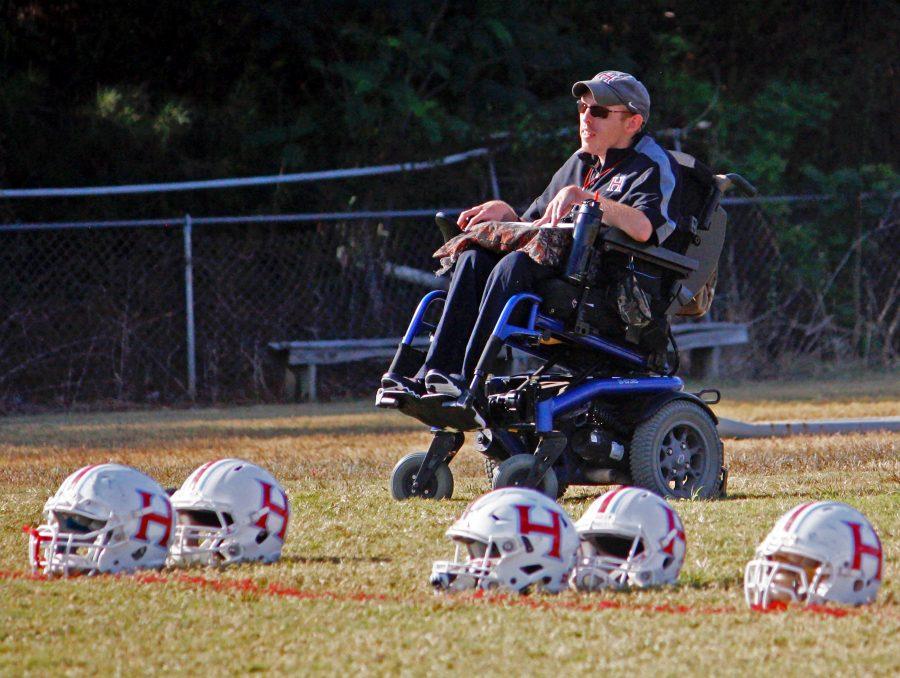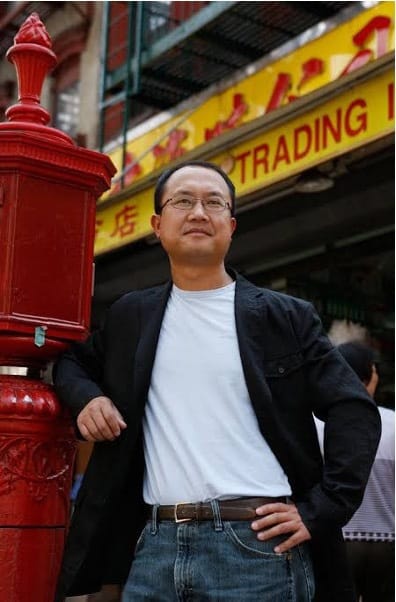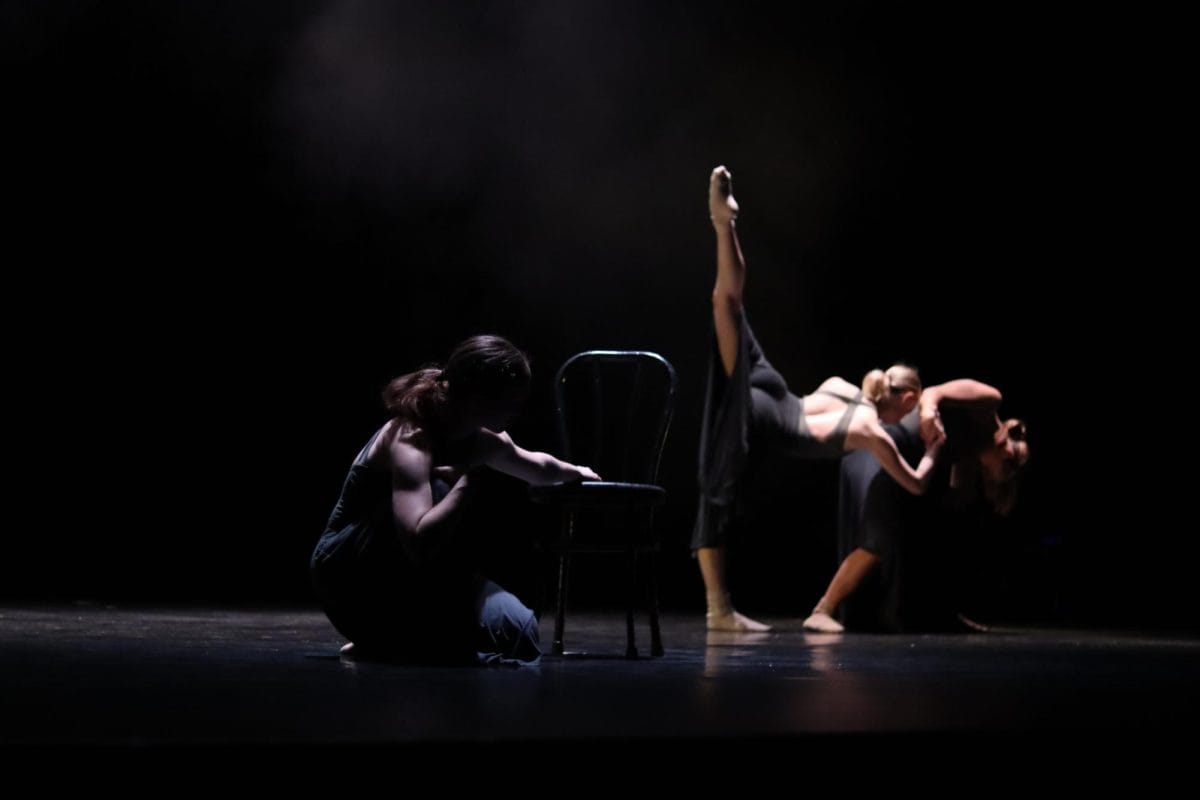On a typical afternoon in the blistering heat of an Alabamian summer, his voice echoes among the scuffles of feet, grunts, heaves and huffs. The sounds of whistle blows and the whizzing of motorized wheels stretch downfield. Teenage boys dressed in pads poking up over their scarlet jerseys, helmeted in scarlet, run from the voice and toward each other as they fight for control of a leathered ball.
His voice trails in the locker room decked with a red awning that reads Hillcrest Football, where mantras like “family” and “win” are painted on the walls. It booms among the racks of weights, the deadlifts and dumbbells, encouraging the fresh-faced runts and seasoned veterans to try harder.
On a particularly quiet day, his voice might be heard all the way down the road to the house with the chain-link fence he shares with his grandparents.
Forrest Mullins dreams of winning a state championship. If he did, then he could die happy even at the young age of 25. He dreams of standing in Bryant-Denny Stadium, just a short drive from the field he spectates, and running through the tunnel beside Nick Saban. He keeps a signed football from Saban and Saban’s wife, Terry, one of his most prized possessions besides a copy of The Tuscaloosa News in which he beat Barack Obama’s election for the cover.
He has many dreams, dreams of working so hard he wakes in a nervous sweat, dreams he doesn’t remember come morning. One dream that persists is being his own man, owning his own house, a goal to which he is still shy of $30,000 short.
For 12 seasons, Mullins, a volunteer coach at Hillcrest High School, has sat on the sidelines pushing the new crop of athletes to run faster and tackle harder. Confined to a motorized wheelchair, Mullins was born with the congenital movement disorder cerebral palsy.
“I live, sleep, eat and breathe football,” Mullins said. “That’s what keeps me going. To all the kids, they’re like, ‘You’re here for us. You push us.’ Really what they don’t know is it’s the other way around.”
Born at 27 weeks and weighing only 2 pounds 14 ounces, Mullins spent his infantile months in an incubator, tubes running through his chest, his muscles not fully developed. The doctors didn’t think he’d live past the first 48 hours. Almost everyday before work, Joyce Mullins would visit her grandson in the hospital.
The young man smoking a cigarette on the back porch is a far cry from that little baby, but Joyce Mullins still worries. Her fingers trace over a news clipping of Forrest, 10 years old, faded yellow by the passage of time. From riding Thompson tractors, buying stacks of magazines and selling tomatoes and collard greens to raise money for a van for him, she’s watched over Forrest in some capacity for all his life.
The two argue about the Habitat for Humanity house Forrest Mullins is trying to fund. Forrest’s house will be one of around 12 built in the Tuscaloosa community this year. Forrest hopes to find a roommate to help with his physical limitations in exchange for a rent-free place to stay, perhaps even a pretty girl. But, Joyce Mullins doesn’t want him to be taken advantage of. She wants him to be cared for.
Forrest Mullins has never lived alone. Growing up, he was shuffled between his divorced parents, but now has little to do with his mother after a falling out. His father, having fallen under hardship, is trying to pick up the pieces and rebuild his life.
For the past year and a half, Forrest Mullins has lived with his grandparents, but he’s worried that they’re getting too old to take care of him. At night, he sleeps with two pillows between his legs, pillows underneath his back, and requires someone to turn him over in bed.
“If we have a real good night, we only have to be up once,” Joyce Mullins said.
Forrest Mullins can’t drive, but his grandparents bought him a 2007 Chevrolet Silverado with a wheelchair lift conversion for $60,000 for his 16th birthday. Joyce Mullins looked small behind the steering wheel, the engine roaring, as the large behemoth barreled down the road, transporting Forrest wherever he needed to go.
“I had a girl down at Taco Casa say, ‘Mama, what are you doing driving that big old truck?’ ” Joyce Mullins said.
Forrest Mullins doesn’t want anyone to take care of him. He never did, but his condition requires supervision.
“Since my back’s been bothering me, it’s getting to where I can’t do as much as I normally can,” he said.
However, their argument is a moot point.
Before Habitat Tuscaloosa will start building his two-bedroom, two-bath house, Forrest Mullins must raise $40,000 in sponsorships. Executive director of Habitat Tuscaloosa Ellen Potts is hopeful he will be able to raise the money by the end of the school year, but Forrest doesn’t understand why some people have their house sponsored by organizations and others don’t.
“It’s not a give-away program,” Potts said. “We sell homes for a zero interest 30-year mortgage at fair market value… Sometimes, we’ll have those requirements. Sometimes, we don’t. It just depends on the individual circumstances. It can be a company that decides to sponsor the house, or it can be individuals that give.”
Forrest Mullins is hopeful though that he’ll eventually raise the money, but at the moment, he only has one thing on his mind – football. Working with strength and conditioning and the cornerbacks, Forrest’s love for the sport started with watching games with his father. In sixth grade, he became his team’s water boy because everyone was trying out, and he wanted to be involved. In seventh grade, he moved up to the high school games, and over the next six years, learned everything he could about the sport, watching films and attending meetings.
“Before ninth grade, I said college wasn’t for me,” he said. “By the end of ninth grade year, I said I’m going to college. I’m going to be a coach.”
For three or four semesters, Forrest Mullins attended Shelton State Community College, but ultimately dropped out. The pain from a pinched nerve in his L4 vertebra, combined with an increased difficulty and lack of accommodations, was too much for him.
“I guess school’s probably not for me,” Forrest Mullins said. “It’s probably not going to happen. When I’m in school, I’m miserable. Partly because I don’t like school, but mostly because I can’t be at football.”
Forrest Mullins couldn’t escape football even on his lunch break. Sitting in the living room, he was engulfed with college football highlights, Joyce Mullins on the outside deck with the landline. More often than not, they communicated through phone. If she would just learn how to text, Forrest Mullins said, then things would be a lot simpler.
Every so often, Forrest’s eyes would glance up to the walls. Overhead, the family name hung in framed white crocheted threads. A Chinese fan stood alongside a taxidermy duck, a preserved verisimilitude of what it might have looked like in life. There was a gun cabinet too, filled with camouflaged shotguns. He had a special gun fashioned with a camera, air tank and firing pin.
During hunting season, Forrest Mullins could be found in the little shack in the backyard that overlooks the deer feeder. He’d sit for hours, gun aimed in patience, for his prey. It was during hunting season that his father fell out of a tree and broke his shoulder, pelvis and wrist. In the commotion, Forrest dropped his phone and broke the backdoor of the house, slamming into it in a mad dash to wave down his grandfather for help.
It’s moments like this that worry Joyce Mullins about Forrest being on his own, but he insists he can make friends with almost anyone. Forrest Mullins is a talker. When he was younger people would look at him differently, but now, he doesn’t give people the chance. Given the opportunity, he thinks he could win over even Saban. The only time he ever found himself speechless was meeting his hero, Nascar driver Dale Earnhardt Jr.
Falling along the median of disorder, Forrest really realized the scope of his condition when visiting the “CP doctor.” A mother and grandmother sat in the waiting room with a boy in a wheelchair, joystick facing the mother so she could steer him. The two talked about the boy like he wasn’t there.
“I like that wheelchair, man,” Forrest said to him. “You got it painted up all crimson. Roll Tide!”
The boy looked at him with the biggest grin.
“It bothered me because even his mom was talking and thinking he didn’t know what she was saying,” Forrest said. “I know kind of where he’s at. He knows way more than y’all think he knows.”
Married and divorced, he rolls with punches like this. A girl he dated once described him as a pessimist, but he said he’s a realist. When he has bad days, he remembers how it feels to be on the field on a Friday night at game time, and in the moment, he’s content.
“We got what we got,” he said. “Your hand’s your hand. You either have pocket aces or pocket deuces. You still have to play with them.”







